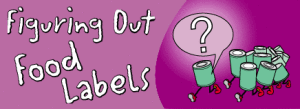Learn The Truth About Food Labels
 As we all strive to eat better, one of the best tools we have is to read food labels… or is it? Below is a collection of the most common “health” terms and what they really mean.
As we all strive to eat better, one of the best tools we have is to read food labels… or is it? Below is a collection of the most common “health” terms and what they really mean.
Zero Trans Fats: Zero doesn’t mean zero; there’s a clause that allows food companies to add in up to 0.5 grams of trans fat, and still market it as zero trans fats. So read that nutrition label and make sure that zero really is listed in the trans-fat line, and watch out for red flag words like “hydrogenated” in ingredient lists.
Sugar-Free: Many products claiming they’re sugar-free or “no sugar added” are generally loaded with artificial sweeteners. Choose natural sugar or sweeteners like honey, and maple syrup.
Hormone-Free: The term ‘hormone-free’ as a label is a bit of a grey area as technically there is no such thing as hormone-free milk or meat, as all animals are born with hormones. What’s more useful is when a label directly says that the product is “artificial hormone-free”.
Organic: The term organic refers to an ecological method of agricultural production that respects the natural environment. Organics focuses on enhancing the health and vitality of the soil, preserving biodiversity, promoting animal welfare and preserving the ecological integrity of our environment. No synthetic fertilizers, synthetic pesticides or genetically modified organisms are permitted in organics. Organic foodstuffs along with livestock feed are inter-provincially regulated in Canada under the Canadian Organic Regulation and must meet all requirements as set out in the Canadian Organic Standard.
Organic Certification: This is the consumer’s guarantee that all food products that use the term organic, actually are. In order to be certified organic all producers and processors must meet all requirements as set out in the Canadian Organic Standard, must apply to a CFIA Accredited Certification Body, and be able to show complete traceability of their products and be inspected by an independent third party. Once a farmer or business is certified it can use the term organic and the Canadian Organic Logo.
Canadian Organic Regulation: The regulation is legislation that has been passed by the government of Canada which states that in order for a food product to be deemed organic, it must meet the requirements as set out in the Canadian Organic Standard and the Permitted Substances List.
Canadian Organic Standard: This standard contains a set of criteria for all methods and practices for producing and handling crops, livestock and processed products.
Requirements for a 100% Organic Label: The product must contain 100% certified organic ingredients, with zero non-organic ingredients , including any processing aids used during product production.
Requirements for an Organic Label:The product must contain at least 95% organic ingredients, with the ingredient exception – any agricultural ingredients in the product must be organic unless not available.
Made with Organic Ingredients :The product must contain at least 70% organic ingredients, with the remaining 30% of ingredients being non-organic.
Products With Less Than 70% Organic Ingredients: Food products than contain less than 70% organic ingredients do not qualify for any organic label and have zero restrictions on other ingredients. The product cannot bear any sort of organic claim on the packaging. *Exception – any product can state organic ingredients in their ingredient statement.
Unregulated Food Labels
Free-Range: This generally means the animals are uncaged, typically with access to the outdoors, although the time period spent outside can vary widely. Free-Run is another term for cageless housing but does not necessarily mean the animals are housed outside.
Grain-Fed: Grain-fed means that animals are fed grain which is the conventional standard in animal production and allows animals to gain weight faster than if they were fed grass.
Grass-Fed: Refers to livestock that have been raised on pasture and not confined to a feedlot or grain-fed system.
Grass-Finished: This means that animals are not only raised on grass but spend their final weight-gain stage on grass. This means that no grain was fed to the animal at any stage in their life.
Local: This term refers to purchasing products that have been grown or processed within one’s geographic region (e.g. a province, or a predetermined distance). Local products are not necessarily grown or raised in an organic or ecological production system as the term only refers to the proximity from production to the sale.
All Natural: The term “natural or all natural” is supposed to mean that the product does not contain added color, artificial flavors or synthetic substances, but as this term is not regulated you can find these words on foods and drinks that are loaded with artificial colors, flavors,and preservatives. A quick read of the ingredient list will tell you if the item is all natural.
Remember that labels are loose and can be relatively meaningless; so make sure you always read the ingredient list to make sure what you are buying, is exactly what you want.

